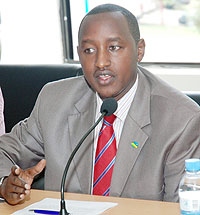A report by the Media High Council (MHC) has indicated that the local media has stepped up efforts to report about the 1994 Genocide against the Tutsi. This was announced yesterday by the council’s Executive Secretary, Patrice Mulama, during a press conference ahead of the 16th Genocide commemoration at the CNLG headquarters.


A report by the Media High Council (MHC) has indicated that the local media has stepped up efforts to report about the 1994 Genocide against the Tutsi.
This was announced yesterday by the council’s Executive Secretary, Patrice Mulama, during a press conference ahead of the 16th Genocide commemoration at the CNLG headquarters.
The report, according to Mulama, is the sixth in a row and has greatly improved from the previous years.
"The report is aimed at analyzing the role of the various media in educating the public and making in-depth content analysis of programmes and newspapers that were broadcast and published from April 1 – 30 2009,” Mulama said.
"The media played a crucial civic role of informing and educating Rwandans and foreigners about Genocide, the security and welfare of genocide survivors and unity and reconciliation.”
However, the report also indicated that the coverage of the Genocide is still wanting in some aspects.
It shows that the media reports were more event-based than issue-based. In both print and electronic media, most items fell into news category compared to interviews, features and opinions.
In broadcasting, news items tallied up to 95.18 percent of the total stories about the Genocide, while in print, constituted 62.03 percent of the total items that were published.
The report indicated that as a result of being event-focused, the challenges faced by the Rwandans during the commemoration period go unreported.
Unbalanced reporting and benign revisionist content was also another issue that was noticed in the media last year, according to the report.
It shows that benign forms of revisionism like genocide memory trivialization in some print media outlets were cited.
According to Mulama, such words used in the media can incite hatred, divisionism, and violence and can even derail the efforts and programmes of national unity and reconciliation.
The acting Director of ORINFOR, Willy Rukundo, highlighted the sensitivity of journalistic work during the commemoration week and urged journalists to always scrutinize their stories to avoid any errors in their reporting.
Ends


